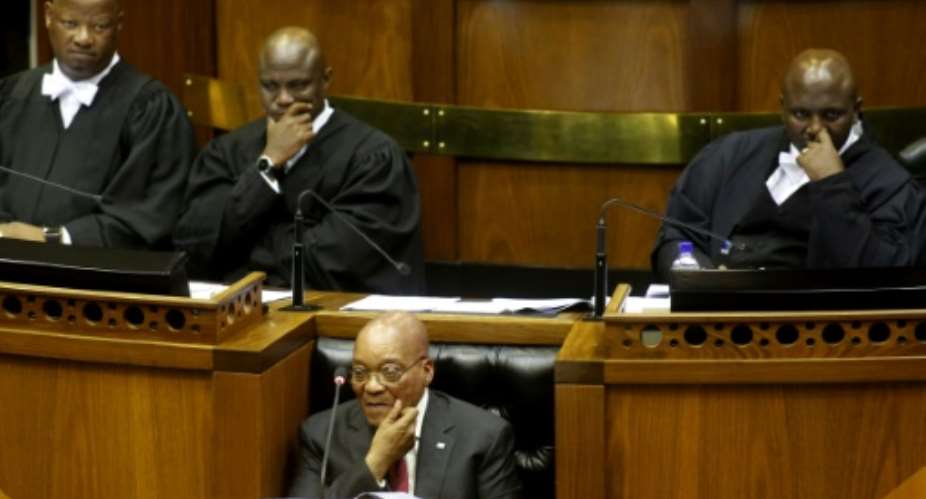Cape Town (AFP) - South Africa's radical leftist Economic Freedom Fighters party Thursday walked out of Jacob Zuma's state of the nation address in the latest attack on the embattled president who is tainted by graft allegations.
In chaotic scenes for more than an hour, EFF lawmakers shouted down the Speaker before obeying her order to either allow the president to deliver his address or to leave the chamber.
"Zuma is no longer a president that deserves the respect from anyone," EFF leader Julius Malema yelled as Zuma sat impassive at the podium.
"He has stolen from us, he has corrupted the economy of South Africa, he has made this country a joke and after that, he has laughed at us."
The EFF lawmakers, dressed in their regular uniform of red workers' overalls and red hardhats, then left the chamber.
The party, which supports land redistribution without compensation and nationalisation of mines, was formed by former ANC youth leader Malema in 2013 and has become an effective critic of Zuma's government.
Its lawmakers had earlier vowed to disrupt the president's address if he failed to explain his sacking of two finance ministers in one week in December, which sent South Africa's rand currency into free fall.
Once he got the chance to speak, Zuma acknowledged that the country's economy was in trouble and pledged to implement "an effective turnaround plan" in partnership with the private sector.
This would include cutting wasteful government expenditure and getting rid of underperforming state-owned enterprises, he said.
Earlier, police fired stun grenades to disperse angry protesters outside parliament shortly before Zuma delivered his address.
Zuma faces moves in court, in parliament and on the streets to have him impeached or dumped by the ruling African National Congress (ANC).
Factors fuelling the calls for Zuma to quit include public money spent on his private residence, damage done to the economy when he fired two finance ministers within days, and government corruption.
- Economy in trouble -
His address to parliament comes just two days after the Constitutional Court heard a crucial case accusing the president of violating his oath to uphold the constitution.
Two opposition parties took the case to court over Zuma's initial refusal to obey a ruling by the national ombudswoman that he repay some of the $24 million lavished on his private home at Nkandla in eastern South Africa.
His own lawyers accepted in court that the case had "traumatised the nation," and conceded that he needed to obey.
But they urged the court not to be "inveigled into a position of making some form of wide, condemnatory order, which will be used effectively for... an impeachment in parliament".
The court reserved judgement.
The EFF has pledged to use an adverse ruling by the court to press for Zuma's impeachment.
Any such attempt however would likely fail in a parliament where Zuma's ANC holds an overwhelming majority.
But critics hope the groundswell of discontent, expected to result in losses for the ANC in municipal elections later this year, could lead the party itself to oust Zuma as president.
The main opposition party, the Democratic Alliance, did not disrupt Zuma's speech, but had called on him to use the occasion to announce his resignation.
Zuma "hops from one scandal to the next, all to protect himself and his cronies... while our country remains on the verge of economic meltdown," party leader Mmusi Maimane said in a statement.
The heightened tension comes amid a sharply slowing economy, high unemployment, grinding poverty and a resurgence of public racial animosity.
The World Bank recently cut its growth forecast for this year to just 0.8 percent.
Commentators have predicted that 2016 could be South Africa's toughest year since the ANC came to power under liberation icon Nelson Mandela at the end of apartheid in 1994.





 Former Kotoko Player George Asare elected SRC President at PUG Law Faculty
Former Kotoko Player George Asare elected SRC President at PUG Law Faculty
 2024 elections: Consider ‘dumsor’ when casting your votes; NPP deserves less — P...
2024 elections: Consider ‘dumsor’ when casting your votes; NPP deserves less — P...
 You have no grounds to call Mahama incompetent; you’ve failed — Prof. Marfo blas...
You have no grounds to call Mahama incompetent; you’ve failed — Prof. Marfo blas...
 2024 elections: NPP creates better policies for people like us; we’ll vote for B...
2024 elections: NPP creates better policies for people like us; we’ll vote for B...
 Don’t exchange your life for wealth; a sparkle of fire can be your end — Gender ...
Don’t exchange your life for wealth; a sparkle of fire can be your end — Gender ...
 Ghana’s newly installed Poland train reportedly involved in accident while on a ...
Ghana’s newly installed Poland train reportedly involved in accident while on a ...
 Chieftaincy disputes: Government imposes 4pm to 7am curfew on Sampa township
Chieftaincy disputes: Government imposes 4pm to 7am curfew on Sampa township
 Franklin Cudjoe fumes at unaccountable wasteful executive living large at the ex...
Franklin Cudjoe fumes at unaccountable wasteful executive living large at the ex...
 I'll 'stoop too low' for votes; I'm never moved by your propaganda — Oquaye Jnr ...
I'll 'stoop too low' for votes; I'm never moved by your propaganda — Oquaye Jnr ...
 Kumasi Thermal Plant commissioning: I pray God opens the eyes of leaders who don...
Kumasi Thermal Plant commissioning: I pray God opens the eyes of leaders who don...
